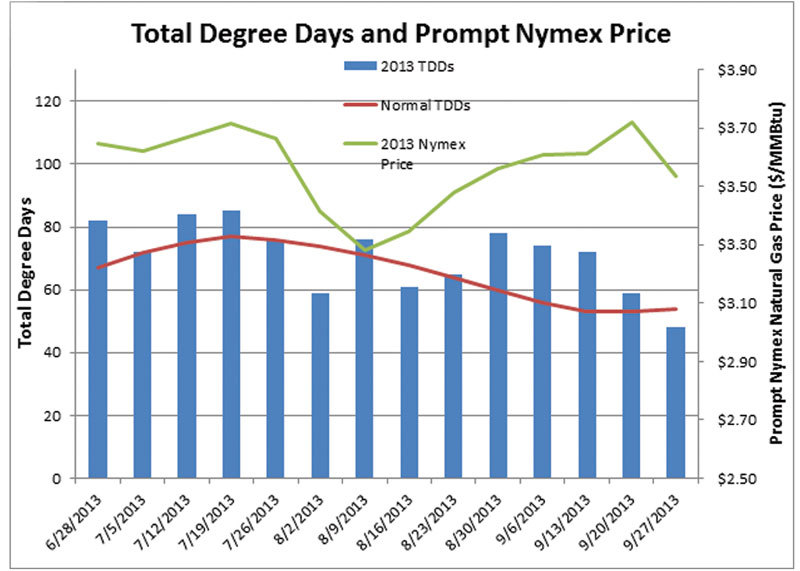Shifting weather patterns impact prices

October 11, 2013
BY Ben Straus
Sept. 30—The month of September has been interesting in the natural gas market with unseasonably warm weather causing a late summer run-up in prices. Typically, demand for power peaks in July and consequently, there is higher demand for natural gas, which, along with coal, is used to help cool American homes and businesses. When comparing the weather patterns of 2013 against the historical norm, it can be seen how a relatively cool August and hot September influenced natural gas prices.
The chart plots aggregate weekly Total Degree Days for 2013 as well as the 30-year historical norms for TDDs, which gives us a sense of how relatively hot a summer month has been. TDDs are calculated by climatologists by taking the difference between the 65 degrees Fahrenheit and the average temperature over the past 30. The chart also plots the price of natural gas, using the prices from the New York Mercantile Exchange, revealing the relationship between prices and weather and shows why natural gas prices rose in September. In the month of July, when summer demand for gas is typically highest, prices were north of $3.70 per MMBtu. In the following month, temperature dipped below seasonal norms, with only one week above the 30-year average level, and Nymex prices responded, dropping below $3.30 per MMBtu. When the weather pattern shifted in September, weekly TDDs were above normal for a four-week stretch, achieving levels normally experienced in July. This extended run of above-average temperatures pushed Nymex prices back to July levels.
Advertisement
Advertisement
Related Stories
The U.S. exported 31,160.5 metric tons of biodiesel and biodiesel blends of B30 and greater in May, according to data released by the USDA Foreign Agricultural Service on July 3. Biodiesel imports were 2,226.2 metric tons for the month.
The USDA’s Risk Management Agency is implementing multiple changes to the Camelina pilot insurance program for the 2026 and succeeding crop years. The changes will expand coverage options and provide greater flexibility for producers.
EcoCeres Inc. has signed a multi-year agreement to supply British Airways with sustainable aviation fuel (SAF). The fuel will be produced from 100% waste-based biomass feedstock, such as used cooking oil (UCO).
CARB on June 27 announced amendments to the state’s LCFS regulations will take effect beginning on July 1. The amended regulations were approved by the agency in November 2024, but implementation was delayed due to regulatory clarity issues.
SAF Magazine and the Commercial Aviation Alternative Fuels Initiative announced the preliminary agenda for the North American SAF Conference and Expo, being held Sept. 22-24 at the Minneapolis Convention Center in Minneapolis, Minnesota.
Upcoming Events










